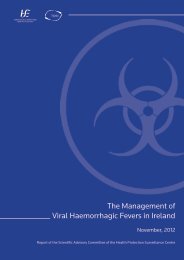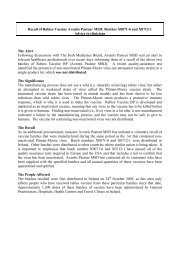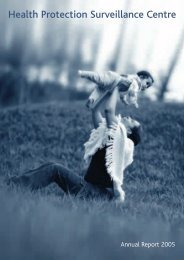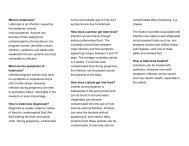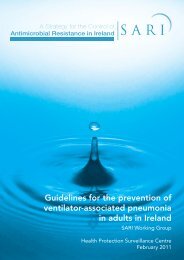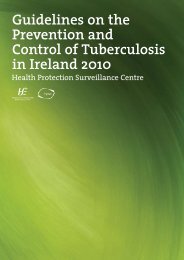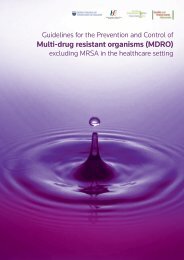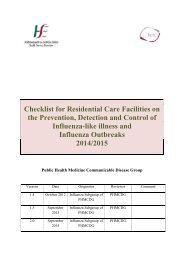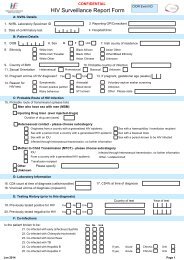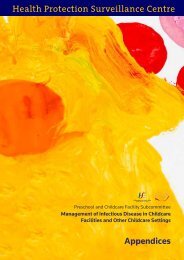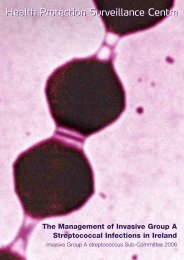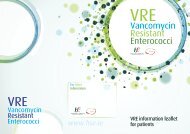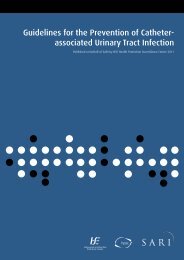Guidelines for the Early Clinical and Public Health Management of ...
Guidelines for the Early Clinical and Public Health Management of ...
Guidelines for the Early Clinical and Public Health Management of ...
You also want an ePaper? Increase the reach of your titles
YUMPU automatically turns print PDFs into web optimized ePapers that Google loves.
<strong>Guidelines</strong> <strong>for</strong> <strong>the</strong> <strong>Early</strong> <strong>Clinical</strong> <strong>and</strong> <strong>Public</strong> <strong>Health</strong> <strong>Management</strong> <strong>of</strong> Bacterial Meningitis (including Meningococcal Disease)<br />
The main questions covered by <strong>the</strong> guidelines are:<br />
• Pre-admission management <strong>of</strong> bacterial meningitis or septicaemia<br />
• Hospital management <strong>of</strong> bacterial meningitis or septicaemia<br />
• Laboratory diagnosis <strong>of</strong> bacterial meningitis or septicaemia<br />
• Identification <strong>and</strong> management <strong>of</strong> close contacts<br />
• Chemoprophylaxis to use <strong>for</strong> cases <strong>and</strong> <strong>the</strong>ir close contacts<br />
• Action required when clusters <strong>of</strong> disease are identified or suspected<br />
• Communications with <strong>the</strong> community when bacterial meningitis is notified<br />
• Recommended Infection control<br />
• Vaccination recommendations (if appropriate).<br />
Methods<br />
Working group<br />
The working group which developed <strong>the</strong> guidelines is a sub-committee <strong>of</strong> <strong>the</strong> Scientific Advisory Committee (SAC)<br />
<strong>of</strong> <strong>the</strong> <strong>Health</strong> Protection Surveillance Centre (HPSC) <strong>and</strong> included pr<strong>of</strong>essionals with <strong>the</strong> relevant expertise <strong>and</strong><br />
experience <strong>and</strong> target users <strong>of</strong> <strong>the</strong> guidelines. The disciplines represented were paediatrics, intensivists, infection<br />
prevention <strong>and</strong> control nursing, infectious diseases, medical microbiology, occupational medicine <strong>and</strong> public health<br />
medicine. The members were chosen to represent a pr<strong>of</strong>essional body or because <strong>of</strong> <strong>the</strong>ir individual expertise. The<br />
Irish College <strong>of</strong> General Practitioners (ICGP) was unable to provide a representative but agreed to be available<br />
<strong>for</strong> consultation during <strong>the</strong> course <strong>of</strong> <strong>the</strong> guidelines development. The members <strong>of</strong> <strong>the</strong> working group <strong>and</strong> <strong>the</strong><br />
organisations <strong>the</strong>y represent are listed.<br />
Search protocol<br />
In developing <strong>the</strong> recommendations in <strong>the</strong>se guidelines various sources <strong>of</strong> guidance were reviewed. Initially, existing<br />
guidelines <strong>for</strong> <strong>the</strong> management <strong>of</strong> meningococcal disease were reviewed both nationally <strong>and</strong> internationally<br />
(specifically English speaking countries). Existing Irish guidelines on immunisation were included in this review.<br />
International documents were also examined from a number <strong>of</strong> sources, e.g. National Institute <strong>for</strong> <strong>Health</strong> <strong>and</strong><br />
<strong>Clinical</strong> Excellence (NICE) guidelines, Centers <strong>for</strong> Disease Control <strong>and</strong> Prevention (CDC), European Centre <strong>for</strong> Disease<br />
Prevention <strong>and</strong> Control (ECDC), <strong>Health</strong> Protection Agency (UK), Australian Government Department <strong>of</strong> <strong>Health</strong> <strong>and</strong><br />
Ageing, Cochrane Database <strong>of</strong> Systematic Reviews, among o<strong>the</strong>rs. In<strong>for</strong>mation which was deemed relevant <strong>for</strong> <strong>the</strong><br />
purpose <strong>of</strong> developing <strong>the</strong>se guidelines was extracted from <strong>the</strong>se sources by working group members <strong>and</strong> <strong>the</strong>n<br />
discussed at <strong>the</strong> working group meetings to ensure that <strong>the</strong> guidance selected was appropriate <strong>for</strong> use in various<br />
settings throughout Irel<strong>and</strong>.<br />
Comprehensive reviews <strong>of</strong> reliable published resources were conducted by <strong>the</strong> working group members. A new<br />
detailed systematic review was not considered necessary, as it was felt by committee members that this would only<br />
replicate reviews which have already been published elsewhere. Available published resources were thoroughly<br />
reviewed <strong>and</strong> <strong>the</strong>ir recommendations were appraised by <strong>the</strong> working group in terms <strong>of</strong> <strong>the</strong> reliability <strong>of</strong> <strong>the</strong> source, as<br />
well as <strong>the</strong>ir applicability <strong>and</strong> operability within Irish healthcare settings.<br />
Where insufficient evidence or guidance was available from <strong>the</strong>se sources, or where <strong>the</strong>re were discrepancies in<br />
<strong>the</strong> in<strong>for</strong>mation or recommendations from several reliable sources, evidence was sought from original research<br />
published in journal articles.<br />
A recognised limitation during <strong>the</strong> development <strong>of</strong> <strong>the</strong>se guidelines was that, in some areas, clear evidence from<br />
research was not available. Where discrepancies or gaps existed in <strong>the</strong> available guidance <strong>and</strong> evidence, expert<br />
opinion was sought.<br />
Consultation<br />
The consultation exercise was carried out as follows:<br />
The draft document was sent to <strong>the</strong> HPSC Scientific Advisory Committee in October 2011 <strong>and</strong> to key stakeholder<br />
groups <strong>and</strong> individuals <strong>for</strong> consultation in October 2011.<br />
-5-



